- Home
- Harlan Coben
The Match Page 3
The Match Read online
Page 3
Carter carefully put on his turn signal and steered hand over hand. Then he looked at Wilde.
“I don’t want to drop a grenade on their lives,” he said. “You can understand that, can’t you?”
Wilde nodded. “I can,” he said.
“When I got home from that summer, Sofia met me at the airbase. She asked me about what I’d done over there. I looked her straight in the eye, and I lied. It may seem like a long time ago—and it is, don’t get me wrong—but if Sofia hears now that our marriage was built on that lie…”
“I understand,” Wilde said.
“I just…can I have a little time? To think about it?”
“Think about what?”
“To think about telling them. If I should tell them. How I should tell them.”
Wilde thought about that. He wasn’t so sure that he wanted any of that either. Did he want three new sisters? No. Did he want or need a father? No. He was a loner. He chose to live by himself in the woods. He was best detached. The only person he felt any real responsibility toward was his godson, Matthew, a high school senior—and the only reason he did was because Matthew’s father, David, Wilde’s only friend, had died because of Wilde’s negligence. He owed the kid. He would always owe him.
There were other people in his life. No man, not even Wilde, was an island.
But did he need this in his life?
When they pulled onto Sundew Avenue, Wilde felt his father stiffen. Sofia and his daughter Alena were on the front stoop.
“How about this?” Daniel Carter began. “We meet for breakfast tomorrow morning. Eight a.m. at the Holiday Inn Express. We discuss it then and make a plan.”
Wilde nodded as Carter pulled into the driveway. Both men hopped out. Sofia hurried toward her husband. Her husband started peddling the PVC pipe supplier story again, but judging by the way she looked at him, Wilde was not convinced that Sofia was buying it. She never took her eyes off Wilde.
When it didn’t seem to be overly rude, Wilde made a production of checking his watch and said that he had to go. He quickly headed toward his rental. He didn’t look back, but he could feel their eyes on him. He slid into the driver’s seat and hit the accelerator. He never, not once, looked over his shoulder. When he got back to the Holiday Inn Express, Wilde packed his bag. There wasn’t much stuff. He checked out, drove to the airport, dropped the car off at the rental dealership.
Then he caught the last flight from Las Vegas back home to New Jersey.
He sat in a window seat and replayed the conversation. He didn’t want to drop grenades on them. He didn’t want to drop grenades on himself.
It’s over, he thought.
But he was wrong.
Chapter
Three
Chris Taylor, formerly known as The Stranger, said, “Next up—Giraffe.”
Giraffe cleared their throat. “I don’t want to sound melodramatic.”
“You always sound melodramatic.” That was Panther. Everyone chuckled.
“Fair enough. But this time…I mean, this guy deserves a world of hurt.”
“A Category 5 hurricane of hurt,” Alpaca agreed.
“A Black Death plague of hurt,” Kitten added.
“If anyone deserves our worst,” Panther said, “it’s this guy.”
Chris Taylor sat back and looked at the faces on his giant wall monitor. To the layman, this looked like a Zoom call on steroids, but this meeting was taking place on a secure video conferencing program Chris himself had designed. There were six of them on the screen, stacked three on top, three on the bottom. Their true images were hidden by full-body digital Animoji of, you guessed it, a giraffe, a panther, an alpaca, a kitten, a polar bear, and The Stranger’s own mask as the group leader, the lion. Chris, who now hid in plain sight in an upscale loft on Franklin Street overlooking the Tribeca Grill in Manhattan, had not wanted to be the lion. He felt the lion was too on-the-nose for the leader, separated him too much from, if you will, the pack.
“Let’s not get ahead of ourselves,” Chris said. “Please present the case, Giraffe.”
“The application was filled out by a single mother—or should I say was a single mother—named Francine Courter,” Giraffe began. Their giraffe Animoji always reminded Chris of his childhood toy store—Geoffrey the Giraffe had been the mascot for the chain Toys “R” Us. Chris remembered his parents taking him there on only the most special of occasions and being awestruck as he entered, the sheer magic and wonderment of the place. It was a happy memory, and he often wondered if Giraffe, whoever they (the pronoun for every member of the group) might be, had chosen this Animoji for this very reason.
“Francine’s only child—her son Corey—was murdered in that school shooting in Northbridge last April. Corey was a fifteen-year-old sophomore. Theater kid. Talented musician. He’d been at a rehearsal for the spring concert when the gunman burst in and shot him in the head. There were eighteen kids shot in that rampage, if you remember. Twelve died.” Giraffe stopped and took a breath. “Lion?”
“Yes?”
“Do I need to go into more details about that shooting?”
“I don’t think so, Giraffe,” Chris/Lion said. “We all remember the news stories. Unless someone objects?”
No one did.
“Okay, let me continue,” Giraffe said. Even through the voice-altering app, Chris could hear the quake in Giraffe’s tone. They all used voice-changing technology of one sort or another. Part of the security and anonymity. The Animoji didn’t just cover their faces either—they replaced their entire appearance.
“After burying her only son, Francine fell into a terrible sadness. You can all imagine, of course. Her way out was to channel her grief, try to do something so that other parents wouldn’t have to go through this hell. She became a vocal advocate for gun control laws.”
“Giraffe?”
It was Polar Bear.
“Yes, Bear?”
“Maybe I shouldn’t raise this, but I’m pro Second Amendment. If someone is disagreeing with this woman’s viewpoint, even if she’s a grieving mother—”
Giraffe cut them off with a snap. “That’s not what this is.”
“Okay, I just don’t want to get political in here.”
Chris spoke up. “We all agreed. Our mission is about punishing cruelty and abuse, not politics.”
“This isn’t about politics,” Giraffe insisted. “Someone truly evil is attacking Francine Courter.”
“Go on,” Chris told them.
“Where was I?…Right, she takes up the cause. Naturally, like Bear said, people disagreed with Francine’s viewpoint. She expected that. But what started as tough discourse quickly grew into a sweeping targeted campaign of terror against her. Francine received death threats. She was constantly hounded online by bots and harassed. Her residence was doxxed. She had to move in with her brother’s family. But nothing prepared her for what really got the ball rolling.”
“And that was?”
“A conspiracy wingnut posted a video claiming that the shooting never happened.”
“Seriously?” Kitten said.
“Guess that CCTV footage of kids being slaughtered wasn’t enough proof for these psychos,” Panther added.
“A fake,” Giraffe said. “That was what the conspiracy video claimed. All staged by gun control advocates who want to take away your guns. Francine Courter was a ‘crisis actor,’ whatever that means, and—this is the truly awful part—the video claimed that her son Corey had never even existed.”
“My God. How did they—?”
“Mostly they just made stuff up. Or they manipulated the narrative to the point of incredibility. For example, they found another Francine Courter who lives in Canada and lists herself as childless, and so they have an audio of the narrator calling her on the phone and ‘Francine Courter’ saying she never had a child named Corey and so, of course, no child of hers was shot or killed. Ergo it’s all a hoax.”
“I can’t with these p
eople,” Alpaca said.
“Bad enough to lose a child,” Kitten, who had an English accent, though again that could be from their voice-distortion app, added, “but to then be tormented by these lunatics.”
“Who is dumb enough to believe this stuff?” Polar Bear asked.
“You’d be surprised,” Giraffe said. “Or maybe you wouldn’t be.”
“What else did the conspiracy video show?” Chris asked.
“Nothing that makes sense. They ask weird suggestive questions like, ‘Why are some of the school CCTV videos only in black and white and others in color?’ as if that’s proof it’s all a fake. Then they doctor or make up evidence with photographs. So, for example—and wow, this is just so skeevy—a bot posted a photograph of someone who looks a little like Corey at a Mets game that took place after the shooting. Then they write, ‘Here’s the actor who played Corey Courter in the Northbridge High shooting at a ball game last week!”’ and then others comment stuff like, ‘Wow, this is proof it was all staged, he looks fine to me, it’s a fraud, stupid sheeple, stop believing what the mainstream media tells you, do your own research, Francine Courter is a traitor,’ whatever.”
“Awful as this sounds,” Polar Bear said, “it seems like we are talking about too many people to take meaningful action.”
“That was my worry too,” Giraffe said, “until I dug into the second video.”
“Second video?”
“So the first video posted on YouTube claiming that the shooting was a hoax was created by an account called Bitter Truth. Eventually it was taken down, but as always with these things it was too late. By then, it had over three million views. It was duplicated and spread, you guys all know the drill. But a second video came out under the name Truth de Bitter.”
“Not much of a nom de plume,” Chris said.
“No, not much of one at all. He wanted us to know it was the same guy.”
“You said ‘he,’” Panther noted.
“Yes.”
“So it’s a man?”
“Yes.”
None of them were surprised. Yes, women troll. But not like men. That wasn’t sexism. That was simple data.
“His second video…” The Giraffe stopped, overcome.
Silence.
Panther broke it. Tenderly they said, “You okay, Giraffe?”
“Take your time,” Chris said.
“Yeah, just give me a second. It was just hard to watch. The link will be in my report, but in sum, the guy goes to Corey’s gravesite. To the tombstone of a fifteen-year-old boy. The guy is wearing all ninja black and a mask, so he can’t be recognized. Anyway, he brings this device with him. It looks like a metal detector you see guys walking with at the beach. Heck, it probably is. He claims it’s a ‘BCD’—a Buried Corpse Detector. He demonstrates at other graves how when he hovers it over the ground, it gets a reading. A sound like static. That’s how the device knows, he claims, that there is actually a dead body buried underneath the tombstone. Then he waves the device over Corey’s tombstone. Guess what happens?”
“Oh my God,” Alpaca said.
“Exactly. He claims the reading says that there is no body underneath.”
“And people buy this?”
“If it fits their narrative,” Chris said, “people buy anything. We all know this.”
“Sadly, I’m not finished,” Giraffe said, letting loose a deep breath. “At the end of the video, the guy urinates on Corey’s grave.”
Silence.
“He then posts the video of him doing that on every page associated with Francine Courter.”
Silence.
Chris spoke first. “What’s his name?” he asked between clenched teeth.
“Kenton Frauling. It took me a while, but I traced at least ten of the bots to the same account as Bitter Truth and Truth de Bitter.”
“How did you track him down?”
“I sent an email pretending to be a member of the media who believed his story. He clicked the link, and well, you know the rest—”
“So not only did this Frauling guy create these awful videos—”
“He made most of the comments, yes. Carried on fake conversations with himself. Attacked in unison. He also hired a foreign bot farm to join him in the ceaseless barrage on Francine. Besides tons of posts on Twitter and Facebook and all that, he calls Francine’s phone at all hours. He sends letters to her home with graphic pictures of Corey, even put flyers on her car.”
“And what’s Frauling’s deal?”
“He’s a thirty-six-year-old sales manager for a large insurance company. Makes six figures.”
Chris felt his hands tighten into fists. This part, the fact that Kenton Frauling had a life, should have shocked him, but it didn’t. Most people assumed that the vast majority of destructive trolls harassing people were unemployed losers furiously posting from Mommy’s basement, but more often than not, they were educated, employed, financially comfortable enough. What they did have in common was carrying some sort of perceived slight, some sort of imagined resentment, some unwarranted feeling of victimhood.
“Frauling has two kids. Recently separated. That’s the outline of the case. I’ve sent you all a file with the videos and posts.”
Chris said, “On behalf of the other members of Boomerang, I want to thank Giraffe for their tireless work on this case.”
There were murmurs of agreement.
“Let’s take the vote,” Chris said. “All in favor of moving forward on Kenton Frauling?”
All voted “Aye.” This was the sixth and final case presented to the Boomerangs today. The rule was, if two members voted nay, the troll was left alone. Of the six cases today, five had passed. The only one that had been rejected involved a pretty-boy reality star getting hounded online. Panther had presented, but the pretty boy was a fairly unsympathetic victim, so they chose to spend their energies on the more deserving.
The Boomerangs’ motto was an obvious one: Karma is like a boomerang—whatever you give out will come back to you. The group carefully selected their targets after a thorough application and vetting process. In his previous guise as The Stranger, Chris had learned the hard way that you only seek justice when there is no question—no reasonable doubt at all—that the perpetrator deserves it. To be absolutely sure, Chris would now comb through Giraffe’s full file to make sure all the details fit the presentation. Doubtful that there would be an issue. Giraffe was the most anally thorough of them all.
“Okay,” Chris said, “let’s talk response. Giraffe, what hurricane category do you want to go with?”
Giraffe did not hesitate. “If there was ever a monster crying out for a Category 5…”
“Aye,” Panther cut in. “Category 5.”
The rest quickly agreed.
The Boomerangs did not go to Category 5 often. Most trolls came in more at a Category 2 or 3, in which case their punishment would involve hurting credit ratings or emptying a bank account or perhaps blackmail, something to teach the troll a lesson but not destroy them.
Category 5, on the other hand, was cataclysmic. Category 5 wasn’t so much about damage as total annihilation.
God may offer mercy, but for Kenton Frauling, the Boomerangs would not.
Chapter
Four
Four months later
Hester Crimstein, celebrity defense attorney extraordinaire, watched her opponent, prosecutor Paul Hickory, adjust his tie and begin his closing statement.
“Ladies and gentlemen of the jury, this is not only the most obvious and clear-cut murder case that I’ve ever prosecuted—it’s the most obvious and clear-cut that anyone in my office has ever seen.”
Hester resisted the urge to roll her eyes. It wasn’t time.
Let him have his moment.
Hickory lifted the remote with a flourish, pointed it at the television, hit the on button with his thumb. The screen came to life. He could have had the image already up on the monitor, but no, Paul Hickory liked a little pi
zzazz, a little showmanship. Hester put on her bored face, so that if any jury members sneaked a glance at her, they would see how unimpressed she was.
Sitting next to Hester was her client, Richard Levine, the defendant in this murder trial. She had discussed with Richard at great length how he should behave, what his demeanor should be, how he should react (or more importantly, not react) in front of the jury. Right now, her client, who would spend the rest of his life behind bars if Hickory got his way, had his hands neatly folded on the table, his gaze steady.
Good boy.
On the screen, there were maybe a dozen people crowded together near the famed arch in avant-garde Washington Square Park. Paul Hickory made a production of clicking the play button. Hester kept her breathing steady as the video started up.
Show nothing, she reminded herself.
Paul Hickory had, of course, played this video before. Several times. But wisely, he hadn’t overexposed it, hadn’t shown it ad nauseam until the jury became numb to the brutality of what they were witnessing.
He still wanted it to be a gut punch. He wanted it to be visceral.
On the tape, Richard Levine, Hester’s client, wore a blue suit with no tie and Cole Haan black loafers. He walked up to a man named Lars Corbett, raised a hand that held a gun, and without the slightest hesitation, fired two shots into Corbett’s head.
Screams.
Lars Corbett collapsed, dead before he hit the ground.
Paul Hickory hit the pause button and spread his hands.
“Do I really need to sum it up more than that?”
He gave his rhetorical question time to echo through the chamber as he strolled from one end of the jury box to the other, locking eyes with those who looked his way.
“This, ladies and gentlemen, is an execution. It’s a cold-blooded murder on the streets of our city—in the heart of one of our most beloved parks. That’s it. No one disputes these facts. We have our victim, Lars Corbett, right here.” He points at the screen, at the fallen man lying in blood. “We have our defendant, Richard Levine, right here, firing a Glock 19 that ballistics confirmed was the murder weapon, a handgun Levine purchased only two weeks before the murder from a gun dealership in Paramus, New Jersey. We’ve put on the stand fourteen witnesses who saw the murder and identified Mr. Levine as the perpetrator. We presented two other videos from two independent sources that show this same murder from different angles.”

 The Innocent
The Innocent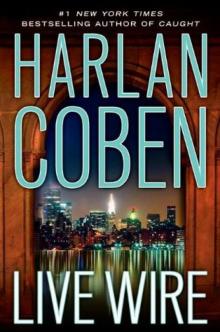 Live Wire
Live Wire Play Dead
Play Dead Drop Shot
Drop Shot Seconds Away
Seconds Away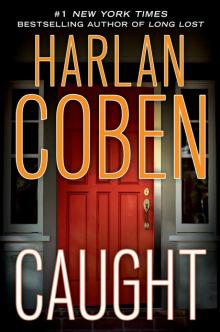 Caught
Caught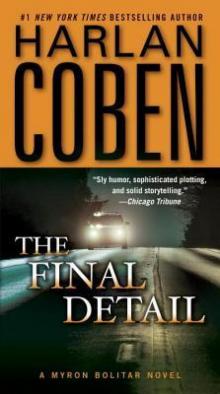 The Final Detail
The Final Detail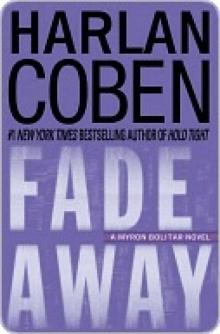 Fade Away
Fade Away Home
Home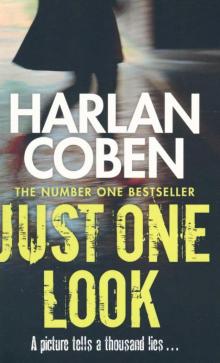 Just One Look
Just One Look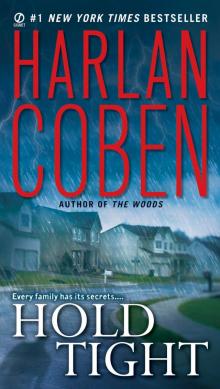 Hold Tight
Hold Tight Fool Me Once
Fool Me Once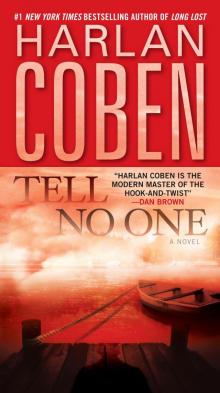 Tell No One
Tell No One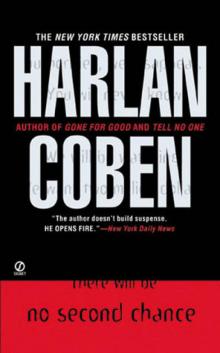 No Second Chance
No Second Chance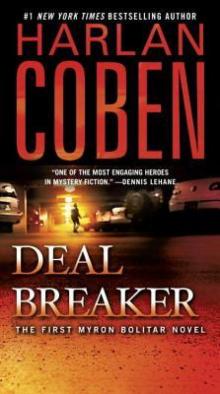 Deal Breaker
Deal Breaker Long Lost
Long Lost One False Move
One False Move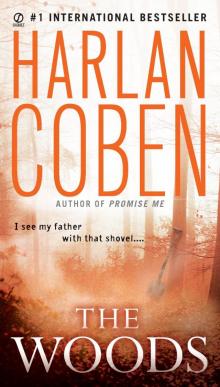 The Woods
The Woods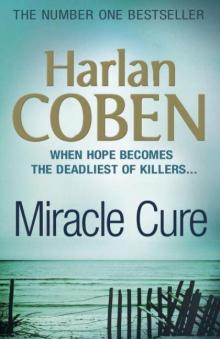 Miracle Cure
Miracle Cure Found
Found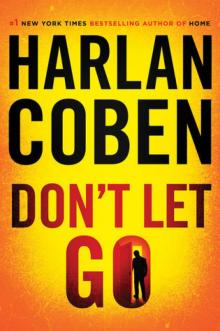 Don't Let Go
Don't Let Go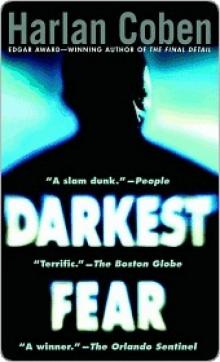 Darkest Fear
Darkest Fear The Stranger
The Stranger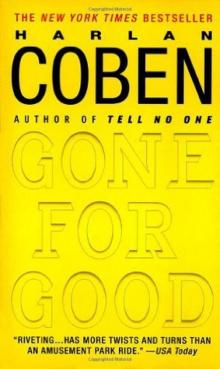 Gone for Good
Gone for Good Back Spin
Back Spin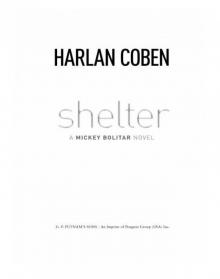 Shelter
Shelter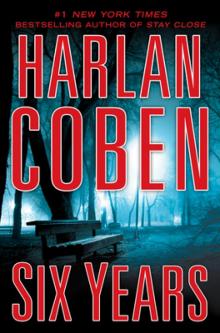 Six Years
Six Years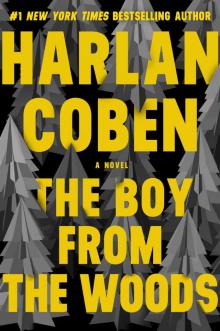 The Boy from the Woods
The Boy from the Woods Missing You
Missing You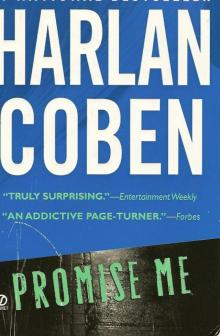 Promise Me mb-8
Promise Me mb-8 The Final Detail: A Myron Bolitar Novel
The Final Detail: A Myron Bolitar Novel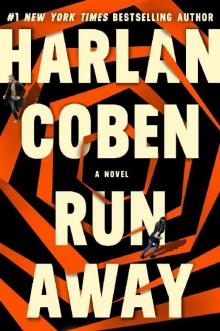 Run Away
Run Away One False Move: A Myron Bolitar Novel
One False Move: A Myron Bolitar Novel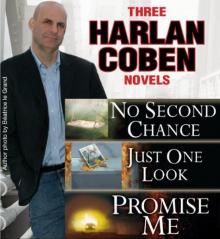 Three Harlan Coben Novels
Three Harlan Coben Novels the Woods (2007)
the Woods (2007) Tell No One (2001)
Tell No One (2001) the Innocent (2005)
the Innocent (2005)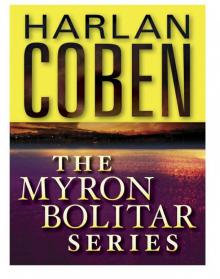 The Myron Bolitar Series 7-Book Bundle
The Myron Bolitar Series 7-Book Bundle Gone for Good (2002)
Gone for Good (2002) Caught (2010)
Caught (2010) Hold Tight (2008)
Hold Tight (2008)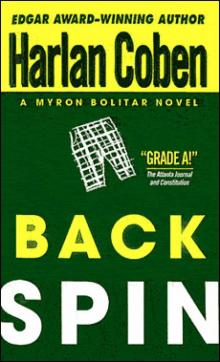 04 - Back Spin
04 - Back Spin Miracle Cure (1991)
Miracle Cure (1991) Harlan Coben 3 Novel Collection
Harlan Coben 3 Novel Collection Just One Look (2004)
Just One Look (2004)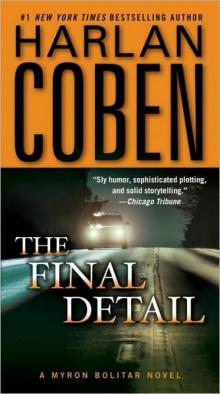 The Final Detail mb-6
The Final Detail mb-6 Play Dead (2010)
Play Dead (2010)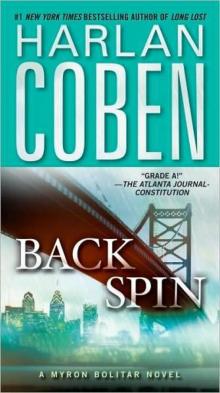 Back Spin mb-4
Back Spin mb-4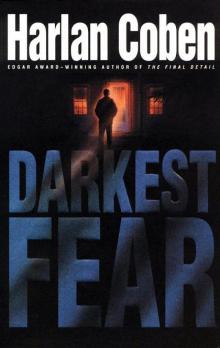 Darkest Fear mb-7
Darkest Fear mb-7